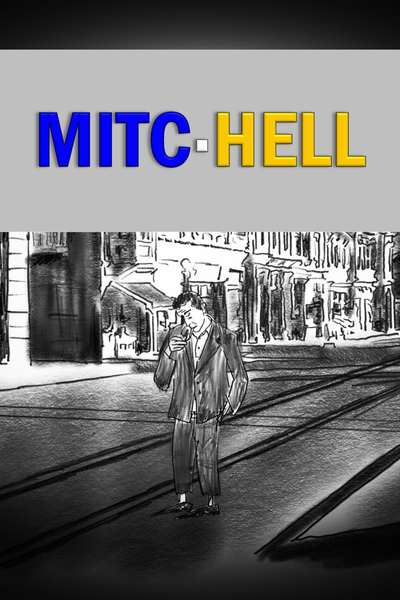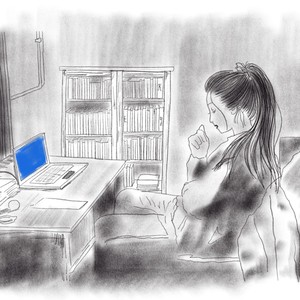INT. 12TH STREET CHAPEL —NOON
The foyer of the chapel is relatively empty, and the hard rubber of Dirk’s shoes smacks the floor. Scents of vanilla and damp roses and perfumes swirled by angelic fans above his head slather him with a semi-visible cloak of smoke that fails to hide the deeper smells of that ancient place: rotten wood, mold-splotched carpet, spiders dead and dried in hidden corners, sweat, wine, and even blood. A large poster advertisement for Hereafter, which shows the dead playing golf, vacationing in the simulacra Bahamas, and communing kindly with the living on what looks like Christmas or some other dimly-lit holiday, sits in the corner of the small room. Pamphlets in a pouch on the poster advertisement are available for the taking. Each pamphlet is emblazoned with RJ’s inhumanly happy face, and Dirk grabs one while students flood around him. The students don’t appear to notice him. Maybe they think he is a part of the mourning family and better left alone.
The floor of the foyer is delicately white like cracked eggshells, and the air is crisp. But when Dirk steps into the chapel, he is assaulted by the populated heat of collective worship. The chapel is darker than the airy foyer, but it is illuminated by rainbow paintblobs of light that ooze out of the stained-glass windows set in every wall. Flickering white light glimmers in points like stars in an aurora from atop various dripping candles set in copper pans and silver-skinned candelabras between vases of roses and lilies and daisies and other fragrant feathered things that grow in colors of green and gold and red and white and lavender. There are cards students have signed and stuffed animals like sacrifices the French trapper would have loved placed all around the room. Kids crammed in pews adjust their pants and pick their noses and text while they wait for someone official to rise above the nervous crowd.
Dirk moves to a seat in the last empty pew along the back wall of the room. The kids around him are bent up over their phones. Some have motion-stimulated battery-saving phone cases, and these shake their phones like high-tech maracas to keep the juices flowing. The lucky kids near power outlets in the wall have moved flowers and offerings and pictures to accommodate their phone chargers, and they sit attentively engulfed by digital blue halos — but the others, whose phones are slowly dying in their hands, murmur assurances to their loved ones as they fade away. A DESPERATE BOY next to Dirk seems especially alarmed.
DESPERATE BOY
I swear on my life! I won’t let you die
again — I’ve got a charger in my bag
and we can go out to the foyer if
you’re getting low. And we can even leave
if it looks like there’s no place to charge…
Meanwhile, a GOSSIPING GIRL sitting ahead of Dirk speaks in a low voice to a friend, who cocks her ear like a cup to collect the delicious words.
GOSSIPING GIRL
I heard that RJ left a note. It said
a bunch of stuff about how he didn’t want
to live in Indiana anymore,
how racist his adopted grandpa was
and stuff like that, and how he’d been talking
with his mom and dad for months, since May,
and how they had a room all ready for him
to come and live with them — some real weird stuff.
And his adopted mom still won’t believe
he hated them the way he said, or that
he wished they never brought him to the states…
Hush: the electric life in the room quickly subsides to a cloud of anticipation when the double-doors on the horizon of the back wall are opened. A man in a purple robe with a gold rope around his neck, who also happens to be the high school principal, MR. KIDDERMAN, walks in. Mr. Kidderman wrinkles his impressively bald forehead into three creases, perhaps symbolically, and steps with authority to the pulpit protruding behind the coffin. The pulpit is flanked by the same picture of RJ that is on the pamphlet Dirk is holding. Small lights go out all through the room as phones disappear into pants and jackets and purses. SOME STUDENTS whisper —
SOME STUDENTS
(decisively sad)
I’ll see you in a minute.
Other students take one last energizing shake of their phones and rub their aching forearms. Everyone watches Mr. Kidderman at the pulpit. The polished wood of the casket below him glimmers in the candlelight, and the overflowing red silk of that final bed rolls out like a useless tongue reluctant to reveal the secrets of its holy guest. Mr. Kidderman gestures magnificently, but mechanically, towards the hidden body.
MR. KIDDERMAN
We all know why
we’re gathered here this morning, but I think that some
people are expecting me to talk
about the consequence of RJ’s actions
because, besides the representative
picked to minister Hereafter in this town
you see before you on the stage, you know me
as the strict principal who roams the halls
in Mitchell High School.
Mr. Kidderman lashes the room with a forceful stare, and the last of the lights from half-hidden cell phones are quickly smothered.
MR. KIDDERMAN (CONT’D)
I’m not here to talk
about the consequence of taking your life;
instead, I want to tell you all about
the miracle that RJ was, what he meant
to people in our little patch of earth,
and how, thanks to the future we are forging
as the first Hereafter Hub in the rural part
of our great state, RJ still has a chance
to make a difference as a part of our town
thanks to the strength of the memories we share
and the impact RJ made in all our lives,
which we all feel so painfully today.
Something escapes from the room, and Dirk notices. You might consider it a sigh, or maybe even a laugh, but it is more like an audible essence of blame that shifts from the audience with the dismissed sense of consequence. Suddenly the people in the pews, who had seemed nervous before, but who we realize now were only feeling very guilty, are baptized by the innocence of their ignorance, and the real power of Hereafter is displayed.
MR. KIDDERMAN (CONT’D)
(maybe shaking with emotion,
but most likely composed and
sturdy as a limestone house)
First, I want to tell you all about
my own experiences with Hereafter,
and how it changed my life. When I was young,
when people still got married when they were young
enough to forget they didn’t know what they were
supposed to do, or how to get it done,
my wife was killed in an accident just off
Highway 60, out near CVS.
She obviously died too soon to be
placed in Hereafter, but before she died,
she bought me a hunting dog, despite how much
she hated all the hunting that I did —
God bless her soul for putting up with me,
as old-fashioned as I can be — as a present
on our anniversary. And that dog
survived my wife until last year, when it died
from ripe old age. I’ll tell you the truth now —
when that dog passed away, it felt just like
my wife had died all over again, and when
I thought about them reuniting in
the afterlife, my wife and the dog she bought me,
I realized it didn’t help me much with grief
despite my faith. I thought it was a sin
to place a person in Hereafter then,
but it didn’t seem so bad to place a dog
in the app, if it would help me settle with
the grief I felt. So that was what I did.
I called the people who worked on the app
when I was feeling low, and I asked them to
make an exception for this dog of mine.
The woman on the line told me it wasn’t
possible that instant, but that they were
working on a thing called AfterPets
as we were talking, and she put me on
a list of people who would be the first
to try it out. When I got my dog in the mail,
I felt a bit led on to think that this
robot in a box could take the place
of the dog I knew from when he was a pup
until the day he died. But I was wrong!
I went through the now familiar process of
placing someone in the app, but with
a pup instead, and when that little robot
came to life, I realized all the relief
Hereafter brought to people — and how could that
be so bad, or be a sin to partake in?
I threw myself into the task of becoming
a convert to the app, and I’m proud to say
that, in the end, I was instrumental in
making Mitchell a Hereafter Hub.
And my greatest hope is that, when we go through
the process of placing RJ in the app
today, that Mr. and Mrs. Johannesen,
that you, Lisa, and you, Jeffry, both feel a bit
of that relief, and that this processes helps
you start your journey to a happier life
full of all your loving memories.
Mr. Kidderman places both hands on the podium, gathering his strength, and smiles at two people sitting in front of the coffin, who you could assume to be LISA JOHANNESEN and JEFFRY JOHANNESSEN.
MR. KIDDERMAN (CONT’D)
Most of you knew RJ from class — perhaps
he sat beside you during social studies,
or maybe he was in your home room, and I know
that many of the athletes here will miss
RJ on the soccer field next year.
But he was more than that: RJ was a great
member of our community, one who,
some might say, we never deserved, but who
came to us in search of peace and comfort,
and most importantly, for family.
I know that Jeff and Lisa gave him all
they could afford to give, when they decided
to bring RJ into their loving home.
Mr. Kidderman gestures towards Jeff and Lisa Johannesen with the same mechanical wave of his hand that he previously used to indicate the hidden body of their son.
MR. KIDDERMAN (CONT’D)
It would have been so easy, when they found out
that having children of their own would be
difficult at best, to move on with
the rest of their lives. But Lisa wouldn’t have it.
She knew the good that they could do for a child,
and all the good that it would do them, almost
like the way we use Hereafter now
to fill the hole in our hearts, and she convinced
her husband to adopt a child. But not
just any child. She wanted to adopt
a child from somewhere life was harsh — a child
who needed saved. And so we got RJ.
We watched him grow from just a little kid
of 3 or 4, with habits you couldn’t help
but love despite their backwardness and the way
you never thought he’d smile until he did,
and it made your day. That’s the RJ we met
at first, and then he grew into a strong,
passionate young man, who did his best
to make this town a better place to live.
Whether it was down at Tulip Street
working with the church, or with the school,
working on the floats for the parade,
one of which we’ll see two days from now
in the glory of his handiwork — there wasn’t
a single boy in school who matched him in
the shop — RJ was always dedicated to
the task at hand in a way you had to admire.
RJ worked hard in the classroom, and he
was on his way to being the top of his class
before the tragedy. As a sophomore,
he already had four letters on his coat
and more at home. He was the type of guy
that you could count on in a pinch, that much
was certain, and I think it is still true
to say he’d never let you down. You see,
RJ had the demons of his past
to battle on his own, and even though
Jeff and Lisa tried their best to help,
and RJ gave them all his worst, he couldn’t
overcome the suffering he left
when his parents brought him here. In the end,
those dark memories got the best of him.
Mr. Kidderman pauses, and the audience seems to reach deep into a well of reverent silence.
MR. KIDDERMAN (CONT’D)
I started by saying that I didn’t want to talk
about the consequence of RJ’s actions
because I don’t believe he was at fault
in what he did. As sad as it may seem,
and just as strange to think of when you’ve spent
your life in relatively blissful
relaxation here in Mitchell, the world
beyond our town is sometimes harsh in ways
we can’t imagine. And the truth of it is,
even though we do our best to spread
our wealth of knowledge and beliefs, and to help
with the bit of money we can make,
even though we don’t have much to give —
but we do give, like Jeff and Lisa here,
what we can afford to give — we can’t
do enough to heal the whole wide world over.
RJ was a victim of our human weakness,
but not our will to help. Nobody here
is guilty, but he’ll be most sorely missed.
Mr. Kidderman, perhaps finished now with missing the dead boy, or maybe distracted by the secret joy of fulfilling his favorite public service, smiles at Jeff and Lisa Johenessen. He waves for them to come to the stage, and they stand. Dirk, almost coming out of a slumber after Mr. Kidderman’s sermon, peeks around the students ahead of him to get a good look at grieving parents. Jeff and Lisa are dressed like they’re about to board a tacky cruise — Jeff in a floral Hawaiian shirt and Lisa in a sundress. Lisa still has her straw sunhat on, perhaps pressed down tightly over the undone curls popping out beneath the brim. Something about her suggests a sense of urgency, grief, or even fear despite her dress, especially compared to her husband, Jeff, who turns around like a gangly graduating student to smile awkwardly at the crowd before leading his wife up to the stage. Mr. Kidderman takes Lisa’s hand, and the three people standing by the coffin form a chain of holy power passing from Mr. Kidderman, through Lisa, out to Jeff’s fingertips, and onto the tablet.
Jeff Johannessen touches the tablet, and it blooms into a blue life.
MR. KIDDERMAN (CONT’D)
(very formally stiff)
Yesterday is gone. Tomorrow has
not yet come. We only have today.
Let us begin.
A light on the tablet flashes. You might think it was magic, or a miracle, but Mr. Kidderman has just announced the program’s starting phrase — nothing more or less. But the noise that moves through the room, whispers like a rustling of unsure leaves, would leave a person thinking less of logic and more of haunted houses. Lisa Johannessen smiles a half-laugh of relief.
MR. KIDDERMAN (CONT’D)
(like a doctor at the
start of an examination)
Was your son a smoker?
JEFF JOHANNESSEN
Never that I know of — maybe once.
LISA JOHANNESSEN
Just once. He stole a cigar on New Year’s Eve,
when we had gone to sleep, don’t you remember?
MR. KIDDERMAN
Did your son drink alcohol?
LISA JOHANNESSEN
(ashamed, but before Jeff
can answer)
Yes.
The Hereafter placement ceremony commences in much the same way it has around the world this last year, from foggy London to lopsided San Francisco, as smoke from the candles condenses around the casket and obscures the stage. Voices from outside the church almost lurch into being in the quiet of that sacred ceremony.











Comments (0)
See all